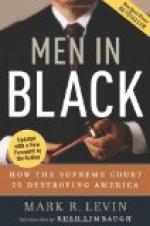The greatest farce that occurs in the court-room is the part of preparation that is involved in getting a case on for trial. There being no limit to the time to examine witnesses, to hear arguments, to listen to objections, it is said to be impossible to tell how long a case is going to take. Consequently the calendar having been called, the cases following are answered ready, by office-boys with no expectation of their being immediately reached.
The grave and reverend judge looks over his desk and calls the case of Bowring vs. Bowring. “Ready for the plaintiff,” answers a rosy-cheeked boy. “Ready for the defendant,” answers another. They look rather young to be trying a case. It is marked ready and the office-boys sit about the court and telephone to the lawyers when they think there is a chance of being nearly reached. This often takes several days. In the meanwhile the cases ahead of the Bowring case have been dragging out their slow and weary performance on the court stage. Matters of fact that should have taken five minutes to bring out by the present usual laborious system of proof, have taken two hours. Argument of counsel on abstruse questions of law have worn and confused the jury and the clients, who have become exhausted and impatient.
The clients and witnesses may have been sitting, trying to understand and becoming more and more mystified.
The dealings of open-handed Justice ought to be plain, prompt, and understandable; instead to the spectator she seems a mysterious jade with no understanding of everyday life. She keeps them waiting there without reason. If the case is marked ready it ought to be ready. The business man feels that Justice is extremely tardy in keeping her appointments.
His natural reverence for abstract Justice prevents him formulating these thoughts, but he continues to wonder. Not understanding the cause he becomes dissatisfied and his experience in court leaves a profound contempt for the system of jurisprudence. He thinks that if any man conducted his own business on the method and plans on which the courts are being run he would soon be bankrupt.
“Why,” he says, “does not the court get in an efficiency expert on this calendar evil and have it arranged on a business basis?”
During the days the case has been on the calendar the lawyer has had to hold himself in readiness to try the case. The managing clerk has been sending out for his witnesses. They have been served with subpoenas and paid their fees to come to court on the day the case was first marked ready. They arrive and are told to come again the next day. They also have a respect for the court and are glad to come to do their duty and tell the truth. The truth is mighty and will prevail; but in court she can only speak through witnesses. Unless the witness be treated with consideration it would seem that she will not speak very willingly.
In place of having them return and return again, some system soon will be devised of giving them timely notice when the case is to be reached. Exhausting the patience of the men who are the props and mainstays of truth does not seem reasonable, and after a few visits to court they are not anxious to come again. If possible they will escape the process server.




